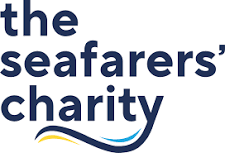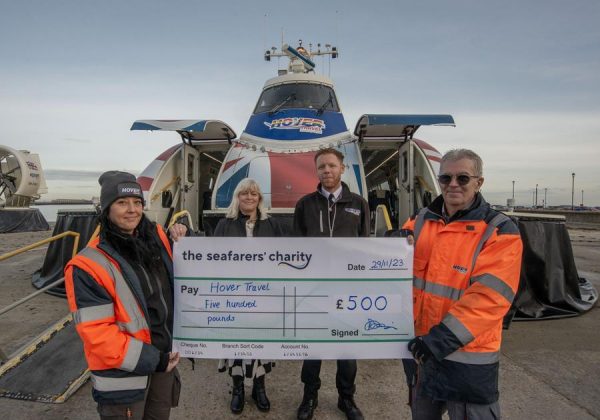The Safety Drill competition from The Seafarers’ Charity encouraged crews from fishing vessels to cargo ships and passenger ferries to show us their muster safety drill. Many of the crews found that through practice they were able to improve their drill time, which in a real emergency at sea, could help save lives.
Today in Ryde, Isle Of Wight, Deborah Layde, Chief Executive at The Seafarers’ Charity presented a prize to Hovertravel Ltd as winners of The Seafarers’ Charity 2023 Safety Drill Competition.
First Prize was £500 which the wonderful crews at Hovertravel have decided to donate to their chosen charity – a new organisation working with Ryde Town Council and raising money to make the beautiful Ryde Beach on the Isle Of Wight more accessible for all, including wheelchair users.
Hovertravel operate the only passenger hovercraft service in the UK, between Portsmouth and the Isle Of Wight. Their crew demonstrated a well-rehearsed passenger evacuation drill and showed how they efficiently evacuated passengers with limited mobility to safety. The judging panel highlighted how interesting it was to see a commercial aircraft style of drill with safety briefings and demonstrations adapted to a marine operation.
Deborah Layde, Chief Executive for The Seafarers’ Charity, summed up her feelings about presenting the prize to these worthy winners:
‘It has been a pleasure to meet the crews working at Hovertravel today and seeing how their crew look after hundreds of passengers and keep them safe during this unique crossing from Portmouth to Isle Of Wight every day. We were delighted when we heard that the crew at Hovertravel wanted to donate their £500 prize to a charity which is improving accessiblity to the beach. Congratulations to all of you!’
The Seafarers’ Charity ran the Safety Drill Competition during Maritime Safety Week. All types of vessels take part and show us their muster safety drill. We judge entries from fishing vessels to cargo ships and passenger ferries. Many of the crews found that through practice they were able to improve their drill time, which in a real emergency at sea, could help save lives.


















